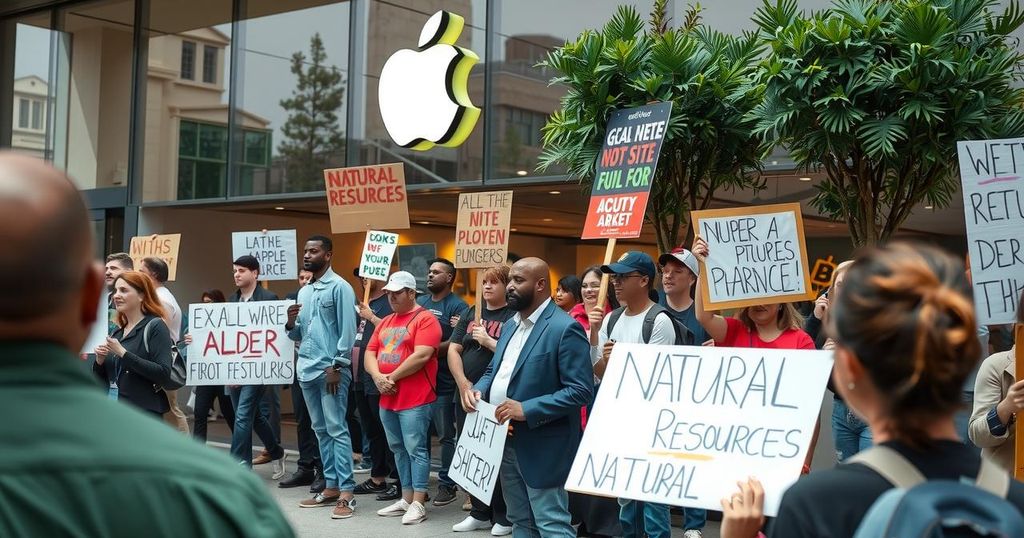Crime
AFP, AFRICA, ALLEGATIONS, APPLE, BELGIUM, BRUSSELS, CHRISTOPHE MARCHAND, DEMOCRATIC REPUBLIC OF CONGO, DR CONGO, DRC, ETHICS, EUROPE, EUROPEAN COMMISSION, FRANCE, FRAUD, LEGAL, PARIS, REGULATION, ROBERT AMSTERDAM, RWANDA, TECH, TIM COOK, UNITED NATIONS, WILLIAM BOURDON
David O'Sullivan
0 Comments
DRC Takes Legal Action Against Apple Over Controversial Mineral Sourcing
The Democratic Republic of Congo has filed a criminal case against Apple, accusing its European subsidiaries of using blood minerals sourced from conflict zones in the DRC and Rwanda. The lawsuit includes serious allegations of war crimes and deceptive practices. The DRC aims to hold Apple accountable for its supply chain practices, drawing attention to the broader impacts of mineral exploitation on local communities in conflict-ridden areas.
The Democratic Republic of Congo (DRC) has initiated a legal case against certain European subsidiaries of Apple, accusing the tech titan of unlawful incorporation of so-called “blood minerals” into its supply chain. The DRC claims that Apple has been sourcing contraband mineral supplies from regions of eastern Congo that are fraught with conflict, as well as from Rwanda, where the minerals are purportedly extracted in violation of legal standards. Additionally, DRC representatives allege that Apple’s operations in France and Belgium have employed misleading commercial practices to create an illusion of responsible sourcing.
Legal complaints against Apple have been formally lodged in Paris and Brussels, citing serious accusations including war crimes, laundering activities, forgery, and deception. The legal pursuit follows previous inquiries directed at Apple CEO Tim Cook concerning the potential intermingling of illicit minerals within the company’s supply chain, inquiries which reportedly went unanswered.
Robert Amsterdam, the DRC’s attorney based in Washington, characterized the lawsuit as a significant legal initiative against a major technology company. He asserted, “Color Apple red, and not green. It is a trillion-dollar company that must be assumed to know the consequences of its actions. Enough with denials of accountability and hiding behind the false narrative of supply chain defenses!” On a similar note, attorney William Bourdon remarked that the criminal complaints represent an important stride towards holding major corporations accountable for business practices that allegedly result in extensive human rights violations in Africa.
The allegations also highlight the detrimental human impact of these mining practices, which purportedly equip armed militias and foster child labor in mineral extraction endeavors. It has been noted that previous investigations undertaken by the United Nations and various non-governmental organizations corroborate the severity of these claims.
The DRC’s legal team has reached out to the European Commission President, Ursula von der Leyen, seeking her engagement in addressing these allegations and facilitating accountability in the mineral supply chains linked to armed conflicts in sub-Saharan Africa. In response, Apple has maintained that it lacks justification to believe that its products contain minerals sourced unlawfully from conflict zones. Rwandan officials have likewise dismissed the DRC’s allegations as groundless, suggesting they are an attempt to shift focus away from the DRC’s own issues. Meanwhile, the ongoing violence in the DRC’s mineral-rich eastern regions has persisted, exacerbated by events such as the resurgence of the M23 rebel group, seeking control over valuable resources.
The Democratic Republic of Congo is known for its vast mineral wealth, including resources that are often deemed “blood minerals” due to their association with conflict and human rights violations. The DRC has long faced violence and instability, particularly in its eastern regions, plagued by armed groups fighting over these valuable resources. The allegations against Apple highlight the complex interplay of global supply chains and the ethical implications of sourcing practices. Legal actions against multinational corporations regarding corporate social responsibility and human rights have been increasing, particularly in relation to the tech industry and its supply chains. The DRC’s legal actions reflect wider calls for accountability and stronger regulations to prevent exploitative practices that adversely affect local communities.
In summary, the Democratic Republic of Congo’s criminal case against Apple highlights severe concerns regarding the sourcing of conflict minerals and corporate accountability in global supply chains. With allegations encompassing serious human rights violations and deceptive business practices, the case underscores the broader implications of international trade on impoverished regions. As the DRC seeks to establish legal accountability and engagement from European authorities, the situation remains a focal point for discussions on ethical sourcing in the technology sector.
Original Source: www.rfi.fr




Post Comment